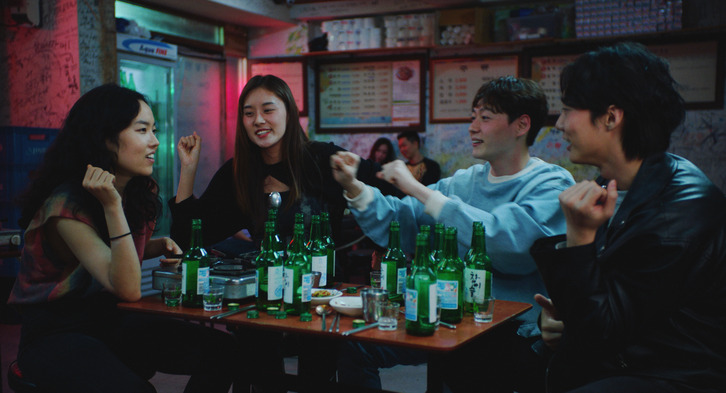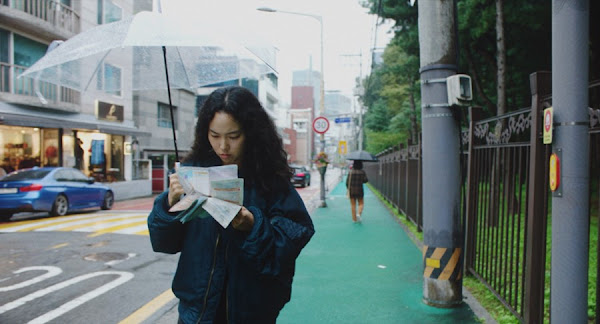Return to Seoul takes us on a coming of age story that occupies the same kind of mould as The Worst Person in the World, a troubled late 20-something caught in a mishmash of identity and persona – as the film dares to ask when they’re freed from the confines of expectation and weight of family, found or otherwise, who are they? It’s a multi-act structure that takes place over a number of years as we follow the self-destructive Freddie, who was given up by her parents and placed in the care of foster parents in Paris. Returning to the different, more conservative culture of Seoul – she’s faced with a reckoning of her parents, her father and her mother, and whether or not they’re even willing to see her let alone allow her back into her life. And with her different life experiences and the fact that she can’t even speak the same language as them, does she even want to try and connect?
The film; directed by Davy Chou, acts as a showcase for Park Ji-Min, who you think has been acting for years before you realise it’s her first performance. It’s phenomenal, multi-layered, full of depth; strength and vulnerability. Freddie is a fearless force of nature to be reckoned with: the final segment of the film sees her become an arms dealer after befriending an older man on a tinder date – the boundaries of normality in a culture that Freddie is completely unaware of are broken down around her at every turn. After a one-night stand, she has to brutally let a guy down who’s developed feelings for her: it’s clumsy, awkward on both sides and he only gets the message when Freddie out-acts her displeasure by flirting with the DJ. It’s a clear sign of rebelliousness and reckless abandonment that drives her character as she figures herself out to be a sense of self- and could she ever be truly happy with who she is?
It’s not a big eureka moment – life isn’t such and never will be. She tells a man; one of her friends, who she takes to her real parents that she can and will cut him out of her life just like that. And she does – we move forward in time. Her parents, both her foster parents and her real ones, come in and out of her life in various stages of conditions and we get to see the evolution and impact of having Freddie return to them has on both sides of her families: her adoptive parents back in France; her real father, a small-town drunkard, and her mother – who wants no contact with her as to who she is. Her father never gets the chance to redeem himself fully because Return to Seoul isn’t that kind of movie – it’s life, it’s ongoing: there are no easy answers, not truly. Added to the fact that there’s a language barrier between the two and whilst her father wants to remain part of her life – it’s very much a double-edged sword that cuts both ways. Freddie brutally tells him at the outset: “He has to understand that I’m French now. I have my family and friends over there. I am not going to live in Korea.”
I love the usage of music in this film, and it already has my favourite needle drop of the year – in the aforementioned scene where Freddie hits on the DJ. It’s an original song: sharp, techy and upbeat – unlike any other music being played in the club at the same time. Music tells us what the dialogue and screenplay cannot: Return to Seoul operates in the same field as The Eight Mountains that aired earlier this year – original songs taking place over solitude to add an extra depth “I never needed anybody, we’re the same…” Jérémie Arcache and Christophe Musset knock it out of the park with the eclectic mix that gives us a vibe that you can’t help but fall in love with – regardless of whether it’s your genre or not.
Chou’s screenplay is keen to avoid conventional approach to happy endings; and in lieu of normality – leads to often blunt cutaways. We see segments of Freddie’s life presented as scenes – memorable experiences after the next. A dancer; a partier – an arms dealer; natural escalation as you do – even though Freddie’s lifestyle may feel entirely different from yours it is something that feels relatable for anyone who’s had a journey of figuring out themselves in their late 20s; the kind of messy part of your life where your personality may be as close to fully formed as it’s going to be but you’re not quite sure what you want to do with it. There’s a lot of false starts, characters introduced who we never see again – characters who recur for two or more segments before dipping out, it’s a movie that portrays life – ultimately, as we know it. Her loneliness seeps in – it’s emotional and moving and we constantly wonder when she’ll connect with her parents – tugging at her anxiety and freedom of expression. This is what makes the film so good, it’s the clash of personalities that we see Freddie undertake throughout the film: one second she’s this lively, confident persona capable of being the literal life of any party she walks in: the next her façade breaks down. I really liked the direction that the film took with her father, Oh Kwang-rok in phenomenal form as always, a humble and good-natured guy dealing with guilt of abandonment despite now living with children.
With so much of her identity tied to finding her parents what happens when that isn’t the case? What happens when her mother rejects her? What happens when there are no answers? Much of Return to Seoul is built around that absence, that belonging, the ability to navigate through a messy period of eight years with the same unmatched confidence of Freddie at her best. As things stand: it might well just be *the* film of the year.



